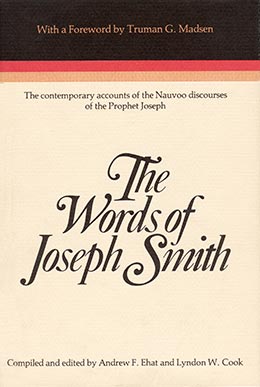13 August 1843 (2) (Sunday Afternoon)
[1] 2. P. M. Joseph as Mayor instructed the Marshall [2] to keep the Ladies camp ground clear of young men.
the city is enlarging very fast. we have so many learned men in this city & the height of knowledge is not to know enough to keep out out of the way. I have been feretting out grog shops, groceries & beer barrels
Mr Bagby of Carthage. [3] who has exercised more despotic power over the inhabitants of this city than any despot of the Eastern country. I met. he gave me some abusive language took up a stone to throw at me I siezed him by the throat to choke him off.
at the Election [4] on the hill they got a Constable name of King [5]—I dont know what need there was of a constable
Old Father Perry [6] said why you cant vote in this precinct. King took me by the collar to march and told me to go away.
All our wrongs have arisen under the power and authority of democracy and I have sworn that I will this arm shall fall from my shoulder and this tongue cleave to the roof of my mouth. before I will vote for them unless they make me satisfaction & I feel it sensibly.—
I was abused and regulated at the ground, and there was not a man in the crowd to say—this is Bro. Joseph. this is the Mayor—
then spoke of the grog shops and the disturbance of the crowd in the street by Mosseur's grocery. [7] Warned the grog shop to be scarce after this time. and the peace officers to take notice of the grog shops and give him reasonable notice.
closed 20 mi.—3—
William Clayton Diary
P.M. Prest J. offered some complaints of the citizens of Nauvoo 1st because some young men sat on the ladies camp ground and laughed & mocked during meeting He next spake of Walter Bagby & the little skirmish he had with him about a week ago he spoke of Esq Wells [8] interfering when he had no business. He then spake of the abuses he received at the election by King [9] & the board of Judges. also of the Grog & Beer shops & said he should rip them up. He then showed that Sidney Rigdon had bound himself by an oath to Governor Carlin to deliver J into the hands of the Missourians if he could & finally in the name of the Lord withdrew the hand of fellowship from him & put it to the vote of the people. He was cut off by an unamous vote & orders to demand his licence. [10]
Willard Richards Diary
P.M. Joseph found fault with the people of the city. some of them concerning Elections.
—13 August 1843 (2)
Notes
[1] See History of the Church, 5:531-32, Not in Teachings. The original sources for the report of this discourse given in History of the Church are the Joseph Smith Diary, by Willard Richards and the William Clayton Diary. The brief notation from the Willard Richards Diary is here published for the first time.
[2] Henry G. Sherwood (1785-1867) was baptized about 1832 and was appointed Nauvoo marshal in February 1841.
[3] Walter Bagby was Hancock County assessor and tax collector, and a bitter non-Mormon.
[4] The state election was held the first Monday in August (7 August 1843).
[5] This may have been Thomas C. King, sheriff of Adams County, Illinois.
[6] Positive identification of this man cannot be made.
[7] Frederick J. Moeser was a Nauvoo merchant.
[8] Daniel Hamner Wells, a non-member at this time, was justice of the peace in Nauvoo.
[9] See note 5, this discourse.
[10] Based possibly on the "Law of the Lord," the History of the Church amplifies this part of the discourse.
He [Joseph Smith] then sat down, but resumed—"I had forgotten one thing. We have had certain traders in this city, who have been writing falsehoods to Missouri; and there is a certain man in this city who has made a covenant to betray and give me up to the Missourians, and that, too, before Governor Carlin commenced his persecutions. That man is no other than Sidney Rigdon. This testimony I have from gentlemen from abroad, whose names I do not wish to give.
I most solemnly proclaim the withdrawal of my fellowship from this man, on condition that the foregoing be true; and let the Saints proclaim it abroad, that he may no longer be acknowledged as my counselor: and all who feel to sanction my proceedings and views will manifest it by uplifted hands.["]
There was a unanimous vote that Sidney Rigdon be disfellowshiped. and his license demanded (History of the Church, 5:531-32).
On the following Sunday, Sidney denied these charges. But on the Sunday after that, Joseph Smith produced a letter from Thomas Carlin that the Prophet felt was evasive and therefore fell short of absolving Sidney of the charge of treachery. The problem was left unresolved until the October 1843 General Conference. At that time Sidney had his trial and was voted to be retained in his station as a counselor in the First Presidency.
